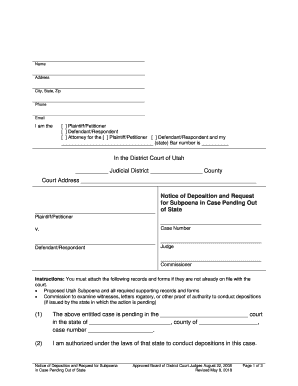Checking Out the Historical Background of Letters Rogatory in Legal Frameworks
Checking Out the Historical Background of Letters Rogatory in Legal Frameworks
Blog Article
Letters Rogatory Explained: Facilitating Legal Collaboration Between Countries

Meaning of Letters Rogatory
Letters rogatory are official demands made by a court in one territory to a court in an additional jurisdiction, looking for support in obtaining evidence or statement for a legal case. This procedural device is important in the context of global legislation, where lawful systems might vary, and cross-border collaboration is essential. Letters rogatory help with the gathering of information that might be critical for adjudicating cases, particularly in instances entailing intricate global issues.
Generally, these demands develop in civil, criminal, or administrative issues where a celebration needs proof that lies outside the jurisdiction of the requesting court. The letters work as a way to make certain that the concepts of due process are supported, making it possible for courts to access proof that could otherwise continue to be hard to reach due to lawful or geographical obstacles.
The use of letters rogatory is controlled by global treaties, bilateral agreements, or residential laws, which define the treatments and responsibilities of the courts included. It is essential to note that the execution of such demands is not ensured; they depend on the regulations and practices of the jurisdiction getting the letter. Hence, letters rogatory are an essential tool for fostering lawful collaboration and ensuring justice across borders.
The Refine of Issuing Letters Rogatory
Issuing letters rogatory includes a structured procedure that makes certain conformity with both domestic and global legal standards. The asking for celebration, usually a court or lawful authority, composes an official request detailing the nature of the help looked for, the evidence or info required, and the legal basis for the demand. This file needs to be precise to facilitate understanding by the foreign territory.

The next step involves sending the letters rogatory to the designated foreign authority. This is typically done through diplomatic channels or international lawful help structures, ensuring that the demand is gotten and recognized by the foreign court. The international court then processes the demand according to its own lawful procedures, eventually reacting to the requesting celebration with the desired details or evidence, hence facilitating global lawful participation.
Importance in International Regulation
The importance of letters rogatory in international law can not be overemphasized, as they serve as a critical mechanism for judicial teamwork throughout borders. These formal requests for support in lawful matters enable courts in one jurisdiction to seek info, evidence, or the existence of witnesses from one more jurisdiction, thus helping with the management of justice in transnational cases.
Letters rogatory are particularly important in the context of globalization, where legal disputes usually extend numerous nations. They enable the collection of evidence that could or else be unattainable, making sure that legal procedures are informed and fair. By fostering cooperation in between judicial systems, letters rogatory help promote the guideline of legislation and advertise shared respect amongst countries.
Furthermore, using letters rogatory demonstrates a commitment to global norms and principles of teamwork, mirroring the interconnected nature of modern-day legal practices. It illustrates the importance of adhering to well established treatments and treaties, such as the Hague Convention, which gives a structure for these demands - Letters rogatory. Ultimately, letters rogatory improve the efficiency of lawful processes, guaranteeing that justice is not impeded by geographical limits
Challenges and Limitations
Regardless of their value, letters rogatory face a number of difficulties and limitations that can hinder their performance. One primary issue is the varying lawful frameworks and procedures throughout territories, which can result in misconceptions and Clicking Here delays in the execution of demands. Different nations may have unique requirements for the credibility of letters rogatory, making complex the procedure further.
Furthermore, the frequently drawn-out nature of worldwide legal cooperation can hinder prompt access to proof or witnesses. This hold-up might negatively influence lawful process or continuous examinations, specifically in cases needing immediate activity. The absence of sources and training in some jurisdictions can result in insufficient handling of requests, leading to incomplete or poor reactions.
Countries with less official legal systems may battle to comply with the step-by-step roughness expected in letters rogatory. These challenges demand continual discussion and reform to enhance the efficiency of letters rogatory in legal cooperation.
Study and Instances

On the other hand, difficulties can develop, as seen in a case involving a European country looking for evidence in a recurring criminal matter from a non-EU country - Letters rogatory. The procedure was delayed because of bureaucratic difficulties and differing legal standards, ultimately impeding the examination
These instances illustrate that while letters rogatory can promote global cooperation and speed up lawful proceedings, they also highlight the need for clear communication and understanding of legal frameworks in between countries. Such study highlight the significance of refining this device to boost effectiveness and effectiveness in international legal matters.
Conclusion
In summary, letters rogatory serve as an important device for helping with lawful teamwork in between countries, ensuring the collection of evidence and testament throughout territories. Their significance in worldwide law can not be overstated, as they promote due process and enhance the efficiency of best site cross-border lawful process. Challenges such as differing lawful structures and political stress might hinder their performance. Proceeded initiatives to streamline and boost the process are crucial read the article for promoting more powerful worldwide judicial collaboration.
Letters rogatory are formal requests made by a court in one jurisdiction to a court in another jurisdiction, looking for aid in acquiring proof or testimony for a legal case. The asking for party, generally a court or lawful authority, composes a formal demand describing the nature of the aid sought, the evidence or information needed, and the lawful basis for the request. The foreign court then processes the demand according to its very own legal treatments, inevitably responding to the requesting event with the sought-after info or proof, hence promoting worldwide legal participation.
Furthermore, the use of letters rogatory demonstrates a commitment to international norms and concepts of collaboration, showing the interconnected nature of modern lawful methods.Worldwide lawful cooperation with letters rogatory is not without its real-world ramifications, as illustrated by various situation research studies that highlight both successes and obstacles.
Report this page